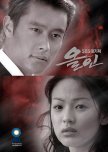
The actors put their heart&soul into it. Soundtrack + camera provide a unique ambience. A Classic.
"All In" is a timeless classic from the early days of KWave. Via main plot and various sidelines involved, you dive into the subculture and parallel world of back room and casino gamblers. In the course of the story, the glitter and glamor of the casino world increasingly take their place, all the way to Las Vegas.Besides the gaming milieu, the series provides insights into the life of simple, poor young people in the late 1990s, which were shaken by the Asian crisis, and offers interesting local color. The well-established KDrama leitmotif 'Orphanage' also has its place here again. Soundtrack and camera capture the action in an atmospheric and impressive manner.
The actors put their heart and soul into it. In the case of "All In" the milieu-specific ambience was supposed to appear as authentic as possible. Therefore, in advance of shooting Lee Byung-hun and Son Hye-gyo (as adults of the main protagonists) went through an intensive training program, including in a casino in Las Vegas: Lee Byung-hun concentrated on virtuosity Card shuffling techniques and the eye dramaturgy of professional players at the gaming table (he won the Grand Prize at the Baeksan Arts Awards that year, as did the drama itself). Song Hye-gyo, on the other hand, was trained as a croupier and not only convinces when she sorts the chips at a breakneck speed.
The opening scene with a helicopter over the Grand Canyon alone is reminiscent of the beginning of a blockbuster à la Tom Cruise or something similar. "All In" isn't just romance, it's also packed with plenty of action, including brawls and gunfights. It's also about friendship among men. As a milieu study of the gamer's world, it's ultimately about gangsters and mafia, too. (Perhaps it is no coincidence that "the godfather" has a guest appearance in the story: it is shown as a movie in the cinema that shaped the youth of the protagonists.) But of course it's also about great love - in the progress of the 24 episodes facing one obstacle after another - it´s makjang after all...
At the time (2003), this KDrama triggered a veritable All-In-Syndrome in South Korea. The filming locations on Jeju Island became a hotspot for fan tourism. The ratings on public television back then are legendary (at around 47 percent).
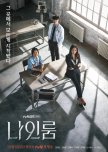
I consider the acting performance in "Room No. 9" as it´s true highlight
Another KDrama about revenge? Not quite. Ok, it´s about injustice done in the past. Yet, it´s rather about the desire for official recognition of innocence, let alone the unjust verdict - as reconciliation with fate. Revenge is secondary. I would say, that is good news. The protagonist is more concerned with her own peace of mind than primarily with new suffering that she in turn has to inflict on her perpetrator. She doesn't want to keep turning the wheel of fate, she wants to stop it.Yet once again, being stuck in the past is a driving force: in this case, the protagonist sits in prison awaiting execution - for decades. ----- SIDE NOTE: South Korea has in practice stopped using the death penalty, but all legislative initiatives to officially abolish the death penalty (most recently in 2019) have so far failed.
Dramaturgic maneuver with magical components: a body swap. The motif is not new to KDrama. Although the personalities in the body are now different, the bodies themselves still have their cellular memories plus the environment inevitably remembers the person originally owning this body. So there is lots of room for funny situations - although they are always solved humorously, they are not slipping into farce. The story is serious and touching, but also playfully told. Laughter is allowed. A teardrop here and there, too.
I consider the acting performance in "Room No. 9" as it´s true highlight: Kim Hee-sun and Kim Hae-sook manage brilliantly to unite the characteristic aura of the other and thus perfectly embody the switch. They are marvelous to watch. And it's a pleasure to see the experience in the body of the other person has a transforming effect becoming a new (cellular) memory...
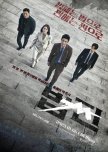
Compelling, complex vendetta, expressive play, impressive spirit & cunning plot development
KDrama Orbit starts into 2023 just as the year 2022 had been – full of productions with their fingers put right into the sore of wounds of society, savouring its imbalance with relish. "Payback: Money and Power", again, is one of those. It offers an exciting, astute, complex and clever story about revenge against those giants, who can hardly ever successfully be confronted by legal means. Money helps… those... who want to have things turn out the way that they prefer… who can afford to have things turn out the way that they prefer... who have a strong vision, too.The underlying premises are pretty sobering, yet well-known territory in KDrama land:
-The system (democracy and the rule of law) serves the money, not the people, because the people who fill the system with life can be bought.
-Power and money are inseparable.
-Hierarchical class thinking is far from overcome. The value of a person's wealth directly determines their value as a human being.
-Huge fortunes and legality rarely go hand in hand.
-The good news for the wealthy: money can buy you justice (and law).
-The bad news for the ordinary: Life is unfair.
-With legal means (alone) justice is not a given.
"Payback: Money and Power" bluntly takes all of these premises and blends them in a vendetta against Goliath revisited. Therefore, David first becomes a Goliath himself. In this case, David's real name is Eun Yong. He has risen from a penniless, simple young man to become the CEO of a private-equity fund who successfully speculates astronomical sums of money. Together with a team, that for him is family, too, he takes on a financial cartel in which politicians and especially the public prosecutor's office are also involved. Thus, it is not played fairly. On the contrary: it is actually life-threatening.
So, at first glance the plot doesn't seem to promise much that's new. Nevertheless, "Payback: Money and Power" offers a dense, strong story, with expressive play and impressive spirit. The presence of the mimes in front of a rough, gloomy background is haunting. To be honest, I paused for a moment - not sure whether I really want to know and see everything or rather drop. Eventually, I couldn't help it, couldn´t let go of it. I WANTED to know and see. The impression, the KDrama left with each episode, was just too powerful... And I'm thoroughly glad about it. A great story. With a considerably cunning plot development. Despite the underlying bitter seriousness an invigorating (for all the refreshing poetic freedom - e.g. not everyone is as talented, tactically adept, self-confident and yet grounded in a good balance of heart, mind and soul as Eun Yong) and encouragingly optimistic perspective.
Oh, actually, here's another premise I forgot to mention at first...
-But what a relief that the law still exists... and also those few, who stick to it, believe in its value and power, and thus keep fighting for it with wits and passion...
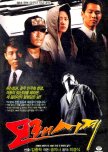
Haunting. Powerful. Taciturn. Unforgettable.
"Sandglass" is a KDrama that relentlessly, sophisticatedly and yet sensitively processes the pain of the South Korean people, that paves the path towards actual democracy. Here you can get a glimpse of a cultural phenomenon: 'Han', a collectively shared sense of painfully experienced injustice (see side note below). "Sandglass" is one of the first KDramas daring to use the medium of television for more than just entertainment. It is also one of the first who could even dare to do so. Here, recent contemporary history is critically targeted from all sides. And at the same time, it becomes a collective vigil for freedom of speech and opinion, for freedom of travel and for the rule of law that have only recently been painfully achieved."Sandglass" tells the story of three young people who were friends during the 1970s and 1980s - Park Tae-soo (Choi Min-soo), who actually would have liked to study but made a career as a thug in gangster milieu, Kang Woo-suk (Park Sang-won ), who hopes for the power of the law and thus studies law, and Yoon Hye-rin (Go Hyun-jung), sort of imprisoned within the golden, solid cage being the daughter of the most influential, officially tolerated casino king in the country, who systematically suplies the government with his money from gambling via anonymous bank accounts. Jumping back and forth in time, the fatal emotional bond between the three is unraveled against the background of social events. It is a dramaturgically conscientious reckoning with the military dictatorship, its abuse of power and its crimes against the people. Original film documents were seamlessly played in, i.e. during the staging of the Gwangju massacre. The presentation of the Samchung re-education camp was also staged as realistically as possible on the basis of original photos and documents. The second half of the story then goes through the destinies of the three protagonists in mafioso style: the gangster, the prosecutor, and the heiress to the casino king. The finale is on the one hand the moment of free election for the people (running in the background), and on the other hand the result of the personal (more or less free) choices of the three protagonists, who still share a world in which despite all recent tumult and uprising basically not much has changed...
More than half of the South Korean population watched the 1995 KDrama "Sandglass". It was praised and praised again. Hard to believe, that it is these days hardly available for streaming with subtitles, never mind as DVD. Apparently, those who have a DVD are reluctant to give it away. I can understand, after I actually saw the KDrama myself - first only in the original version without subtitles (wasn't that bad, because mostly there isn't much talk :-) ), then with a time delay also with subtitles (it was definitely helpful :-) ), and by now also knowing a little more about that historic background. "Sandglass" is truly a masterpiece. Yes, it is taciturn, thrives on the acting, on long shots and on purposefully used, deliberately reduced light. It doesn't sugarcoat anything. It wants to let it sink, each and every moment. The camera accompanies the events almost like a documentary. Without comment, sequences, events, moments in time stand side by side. The story unfolds like a suction and draws you in. The soundtrack supports this pull effect. The story takes its course, the course of which is known, i.e. is predictable: Park dictatorship / suppression of democratic aspirations under the pretext of North Korean infiltration / Chun Doo-hwan supreme military leader, commander of the security and finally new president by coup d´état / martial law, Gwangju Uprising and massacre / cleansing camps / June 1987 fight, abolition of censorship, end of military dictatorship / free elections in 1992. Amazing and grandiose that via TV series a critical review of those bloody 1980s was already possible in 1995. It's brilliant, too, how the protagonists with their very different backgrounds, values and goals are fatally interwoven and mercilessly swallowed up by historical events and social circumstances.
A fantastic K-Drama. Completely consistent. first class.
A sad story. Not funny. Not at all. You have to be able to get involved with the dramaturgically idiosyncratic, taciturn handwriting. (The mood should be right, so to speak.)
(And yes, it's an old ham when it comes to production quality. Screen format, picture and sound quality can hardly keep up with the Netflix era - a digital remastering would definitely be desirable...)
Anyone who is interested in the topic but can't get to the KDrama can grab an impression of the Gwangju massacre in "Youth of May" (2021), or a feeling for the time under military dictatorship and for the concentration camps in "Giant" (2010).
However, if you have the opportunity to see "Sandglass", I recommend that you go for it. Even without historical or socio-cultural interest, KDrama has a lot to offer in terms of impressiveness and melodrama.
------------------ HISTORICAL BACKGROUND INFORMATION -----------------------
Admittedly, being able to classify the historic events, helped for me. E.g. at the beginning there are scenes in which thugs and police bus-wise arrive at a building and disperse the opponent party´s event. This was actually the key historical point, marking the beginning of the massive social unrest, which resulted in actual free elections 13 years later. In fact, it was originally a comparatively small strike in 1979, which took place on the 4th floor of the New Democratic Party's headquarters. Around 200 women, workers at the textile company YH Trading Corporation, protested against the closure of their factory. Unions had no place during Yushin dictatorship, however his sit-in-demonstration was actually almost too minor, to interfere. Nevertheless, the government used the particular context at the opposition party building as a cover for a major anti-opposition operation - 'Operation 101'. Around 1,000 police officers in uniform and civilian gangs of thugs assaulted leading party members and 174 of the demonstrating women workers. Union leader Kim Gyeong-sook died while jumping out of the window.
The civilian thugs (fictional Tae-soo in "Sandglass" being one of them), were subordinate to the main money-provider of the regime (here the casino king and Hye-rin's father, who clean-washed his income for political means.)
That factory workers´ trade union action by no means was the reason for the following uprising. However the occasion served as the momentum for what was to come. Against this background, the later (fictive) encounter between Hye-rin and one of those women from 1979 becomes understandable. Hye-rin adores the by now torture-broken woman for her brave fight for democracy back then. That woman, however, never wanted a political revolt, she just didn't want to lose her job. In fact she feels betrayed and instrumentalized in a political fight that she really didn't want to fight and in which she lost everything, even herself, her dignity and self-respect.
Responsible for the politicization of events that had taken on a dynamic of its own, was actually the Park regime itself: it´s attempt to split and suppress the opposition. By demanding the party leader Kim Young-sam and his deputies to resign from their mandate provoked and politicized the public. Since this coincided with the beginning of the winter semester, the student movement, too, took the incidence for a red-hot political profile: demanding the end of the Park government. A corresponding demonstration in Busan was violently suppressed in this context. A few days later, president Park was assassinated by the head of the Korean Central Intelligence Agency (KCIA). This assassination had nothing to do with the students and their demands. Neither does North Korean Communism. It just coincided timewise with the Busan demonstration. The military, in turn, took advantage of the political power vacuum situation, imposed martial law on the mainland, installed a far-reaching investigative body and thus paved the way for the meteoric rise of Chun Doo-hwan, who was appointed chief investigator. He used his chance consistently and purposefully. After 8 months of military coup, the country had a new dictator in uniform who presented himself as the savior of the nation.
He repreatedly and systematically declared the pro-democracy drive the enemy by spreading conspiracy and infiltration theories about North Korea's ambitions. Press and public were massively manipulated with so-called K-operations (king´s operations) in order to convince the people by the good of military rule. The credo was: the military and Chun Doo-hwan were the only chance to counter the spreading, communist-manipulated unrest, in creating something like order and security. At the same time, the military units were drilled with the so-called Choongjung (True Heart) training for a particularly aggressive and efficient suppression of demonstrations. New paratrooper units were created as special forces. In addition to physical fitness, the training included the development of a strong corps-spirit and the use of massive violence and targeted abuse.
Against this background, the situation among the military units deployed in Gwangju in May 1980 can also become somewhat more understandable. On the one hand, they were brainwashed. On the other hand, to date it has still not really been clarified who gave the orders for the escalating violence in May 1980 - e.g. orders to shoot and the use of paratroopers. Internal ambivalence and irritation was common at all levels of command. But that didn't help. In the end the corps-spirit was more binding and prevailed. In this respect, the executing soldiers, as perpetrators, somehow became victims in those sad May days, too. The proclaimed enemy - North Korean Communism, which is behind the pro-democracy movement - and the unshakable pillar of power - the military dictatorship with all its arrogance - posed such a strong, effective, powerful threat, so that it was so frightening people in uniform (and without) and made them hitting their brothers and sisters indiscriminately (again, after barely three decades). Because someone had chosen Gwangju as the place of the example. And because the sides there had just turned out that way - those who lived in, studied in or visited Gwangju on the one hand, and those who were doing their military service at nearby barracks at the time. On the other hand, the political vision or just a simple wish, that everybody might finally live freely under fair conditions, seemed hopeless. Suddenly the fight was (rather apolitical) about pure survival and desperate rebellion against arbitrary violence.
Eventually, with "Sandglass" the South Korean population became seriously aware of what had really happened in Gwangju in 1980: a people´s uprising against military oppression, being brutally suppressed. Because of the propagandistic K-operations and the censorship (which was repealed only in 1987), knowledge of these events was never really able to spread. Numerous witnesses had deliberately been put into camps or imprisoned. For the television audience in 1995, these street-fighting scenes must have come as a complete shock, not only because they are terrifying in themselves (regardless of where and when), but because they actually had taken place in such brutal manner and in such close proximity completely without their knowledge. In this way, "Sandglass" also became the trigger for nationwide latest history processing. The TV production paved the way for more critical historical scrutiny in the media and also apparently accelerated the course of the trial and sentencing of ex-President Chun Doo-hwan in 1996. He was sentenced to death. (However, on appeal it was turned into a life sentence. His assets, of course, were safely parked, too. He died of cancer in 2021.)
---------------- Side note: --- NATIONAL SECURITY ACT ----
The National Security Law has been in force in South Korea since 1948 - until today. Its primary purpose was to push through anti-communist propaganda and to control or shut down opposing intellectuals, artists, journalists, students etc.. This National Security Act de facto restricts freedom up to this day and ultimately violates the 1948 Universal Declaration of Human Rights and the 1976 International Covenant on Civil and Political Rights, which South Korea had actually ratified. Fatally, it seamlessly continues a relic from the days unter Japanese rule. Several 100,000 people have fallen victim to this law over the past few decades. The verdicts resulted in prison sentences of thirty to forty years, which is among the longest in the world. It has served military dictatorships well, opening the door to arrest and torture countless times. Even after the end of the dictatorship, as late as 1989, obviously an average of 3.3 people each day were arrested, tortured and sentenced to prison under this national security law. To this day, the law is still officially considered constitutional...
--------------- Side note: --- RE-EDUCATION, CLEANSING AND CONCENTRATION CAMPS ---
A unique dubious institution during the Chun Doo-hwan dictatorship were the concentration camps for re-educating unwanted citizens. 25 such camps were set up in the aftermath of the Gwangju massacres. They served to systematically clear the streets of South Korea of unwanted people (and yet mostly arbitrarily as a military demonstration of power). The camps were primarily used for brutal abuse - any dignity was broken, body and soul pushed to the limit.
The detainees were divided into 4 categories: A implied prison; B and C an agonizing time in one of the re-education camps; D a warning. Category B and C inmates often ended up in prison as well, provided they survived the re-education camps. E.g. a former military prison in Yeoncheon, Gyeonggi was thus modified according to 'Samchung Plan No. 5'. This location officially was established to fight North Korean Communism: up to 100,000 innocent people may have gone through hell without a warrant - and rarely enough survived.
--------------- Side note: --- HAN ---
Han can be considered a collectively shared, identity-forming cultural pain in the sense of sad and angry grief. This cultural characteristic developed in the course of Japanese colonization of Joseon. There has been, and still is, debate about the extent to which Han can or cannot be considered a collective trait that creates identity. In any case, as a shared painful experience of that time, a specific form of expression of grief developed, while behind melancholy suppressed anger also resonates. Han has found its very unique solemn, deeply and sadly swinging aesthetic in Korean culture, which we can observe/feel in music, film, television, literature, poetry etc. It can be considered a collectively shared state of mind, that feeds on the traumatic experience of humiliation and abuse as a people that Joseon endured so massively at the hands of the Japanese oppressors. Han addresses helplessness in the face of overwhelming injustice. But despite all the pain and sadness, there is also something tough in Han: an inner resilience, a rebellion, that still provides something like strength in the darkest depths.
Han was further nurtured in the post-Joseon era by the separation of families into two antagonized nations. Finally those brutal 1980s, which are revived in "Sandglass" in the sense of a solidary vigil, tie directly to this collective Han - as a basic feeling that continuously and silently runs through (especially) the first half of the KDrama. A collective emotional state from which one cannot escape: the experience of suffering; the ability of suffering; the national destiny of suffering.
In the course of South Korean turbo-capitalism over the past two decades, Han as an issue has receded somewhat into the background among the younger generation. Nevertheless, there is already a new, modified, less beautiful form of expression: ´Hwabyeong´, the culture-specific Korean manifestation of a depressive psychosomatic disorder with characteristic symptoms, that already affects wide circles - as a result of suppressed anger in the face of overwhelming social circumstances experienced as unfair. (e.g. victims of any sort of bullying in school or at work etc.)
(I wonder, whether it would not be better to continue to give Han an explicit, contemporary, aesthetic expression - in contrast to the embellished, perfected facades e.g. in KPop + KDrama culture... but that would be another topic.. .)
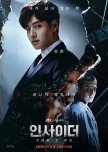
Suspense-packed. Elusive. Tough - KDrama shows us a poker face in several ways
"Insider" grabbed me from the first minute. It was exciting and unpredictable, fascinating regarding the world of card gambling and convincing with a consistently top-class cast. The story is knitted around the ever topical issue of corrupt South Korean society. You will not find good and bad in the classic sense. Dark shades of gray on the gloomy side dominate the picture. The focus is on the sobering practice of substituting compromises for morale. And those who are not willing to compromise may experience violence. In this context, the KDrama is also brutal on a high level.Can one person change the predicament of a corrupt society? In recent years, the KDrama has conspicuously often asked this question. Here the son tries to do the same as the father and at least tries... because: if you don't at least try, then nothing can change. So he wants to go to court and do his part there to ensure justice. Also undercover, if it may help. The question remains: Can one person change something about corrupt social structures? Does it help when illegal activities are uncovered? Or will everything in the end remain as it was, since new characters simply fill the vacant roles?
"Insider" focuses on the networking of politics, criminal prosecution and specifically institutionalized criminal organizations. Democracy has practically no chance in the face of these almost overwhelming networks that decide in the background and create facts. It's bitter to see. In particular, the handling of the law, which appears to be swung almost like a sword in the interests of the powerful, thus relentlessly destroying any hope of justice for honest people.
In this respect, "Insider" is more of a pessimistic story. I admit that I'm ambivalent about this overall quite brutal KDrama. It's repulsive but fascinating at the same time. The story ruthlessly unfolds its impenetrably entangled threads. It tells of outrageous machinations of the powerful and infernal manners in prison. Also about being mercilessly dependent on oneself. It tells of the desperate attempt to avenge injustice.
The dramaturgical leitmotif running through all of the 16 episodes is quite concrete and also symbolic: the impenetrable poker face. Illegal gambling with cards dominates "Insider" from the first minute to the end. Especially at the beginning, the card game itself is in the foreground. As the series progresses, the viewer's perspective shifts to the meta level of casino management and what may be attached to it. But who is up to something here and who is on the side of the protagonist remains unclear until the end. Who or what should you bet on? KDrama also shows us its poker face and simply plays its cards unperturbed - one episode after the other, until the end.
In my opinion, the permanent increase in tension during the first 8-10 episodes, which are mainly focused around prison-life, is like a permanently increasing climax - and the most impressive (yet challenging) part. After that, the actual revenge campaign can only lose. Not because it is not also based on a high level of quality, but simply because this permanent increase in tension cannot be continued forever. In the meantime, the audience has so many open plot threads in their hands that they now want to be resolved before they completely lose track (and interest).
Kang Ha-neul as main lead is incredible. He embodies the difficult process of change in the personality of a highly motivated young trainee at court who involuntarily has to get to know the dark end of society up close. If he doesn't conform and play by their rule, he won't survive. However, if he survives in this dark parallel world, he can never be who he was.
But everyone else around him also keeps up the intensive field and contributes to the convincing overall performance. I was particularly drawn to Kang Young-seok, who practically excelled alongside Kang Ha-neul in the first half. It's unbelievable how he manages to embody the worst merciless willingness to use violence on the one hand and yet still somehow is able to win sympathy on the other. A strong, unforgettable performance!
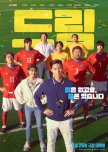
The KMovie is carefree, harmless and heartily. However, it is not trivial.
"Dream" is about team spirit as a positive force that allows a group to excel itself. The KMovie is carefree, harmless and heartily. However, it is not trivial, as it sides with those commonly referred to in society as the weak.You shouldn't expect too much, then everything works quite well. Obviously, IU and Park So-joon are the show's carthorses. But that doesn't do justice to the rest of the cast, who all contribute their unique esprit. “Dream” comes across as teamwork through and through.
Although it was filmed at original locations in Budapest, somehow, in my opinion, the casting (unfortunately) often enough doesn't work so well, when Korean productions are dependent on actors from different origin. For whatever reason. Even if it's only supporting roles or extras in this case, they seem to be rather amateurish. Hm.
All in all: “Dream” is a KMovie for high spirits and light fare. Not intrusive. With a few flaws here and there. However, also with some well-placed, wonderful and valuable messages in passing.
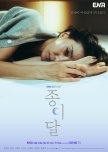
More than a remake. Delicate timbre. Powerful. Reckoning with the void of a luxury-branded world
"Pale Moon" develops a particularly delicate timbre. Fine personality portraits, none of them smooth and pore-deep clean, but rather inwardly crumpled people with dreams and weaknesses, people who sometimes make questionable decisions, who don't stick to the rules, who succumb to the temptation to take the chance to realize their dreams.A little 'noir' here and there. In any case, emotionally dense. Unexcitedly emotional. Quiet and yet powerful.
The KDrama is based on a Japanese Original (Mitsuyo Kakuta), which was successful as a series and movie, too. This is now a South Korean remake. Apparently, Kim Seo-hyung was immediately (after she saw the original in 2015) determined to play the female lead in any potential South Korean remake. You can tell, she is breathing her role.
The original novel is about the embezzlement of bank funds as actually happened in Japan. In South Korea, the list of embezzlement in billions is also long and the remake is accordingly well placed.
However, the South Korean remake is about more than misappropriation of wealth on a large scale. This is generally about lies, deceit and deception - even on a smaller, manageable, interpersonal level. However, it is also about human vulnerability, the cracks in the facade.
The story unfolds against the background of unstoppable consumption - a veritable frenzy of consumption that has long since left any connection or grounding behind. A life-style in a parallel world, that only a few can really afford. This world of luxury, which initially seems appealing, develops an intoxicating, addictive character and ultimately catapults itself into the void. What remains when the lover equips the lover with the designer goods from head to toe, from the car to the house including the interior and the laptop, too? Alert, alert: the luxurious world of matter - initially well camouflaged as the lifestyle of your dreams - becomes an ugly parasite that feeds on substantial emotions, liveliness and passion, but in the end leaves nothing behind...
In the field of tension between the dreary normality of a boring everyday life that is perhaps pimped out on the outside, but emotionally rather empty, almost everyone here is willing to deviate from the path of virtue in order to get a piece of the promisingly dazzling consumer cake.
Nevertheless, the story also tells of the sincere moments of perception and recognition of unsightly vulnerability. These are the moments when sincere encounter happens to become possible. On the outside, these are not the nice, shiny TaDa moments, but on the inside they provide light and warmth, they nourish the soul, like water making flowers bloom. Moments that cannot be bought with money. Moments that are among the most worthless in the dazzling world of consumption, shunned, despised, marginalized, excluded.
In this way, "Paper Moon" is an intelligent approach of reckoning with the consumer-driven social reality in which 'appearance' takes the place of 'being'. Quietly and constantly the KDrama is reminiscent of the basic in human, which has nothing to do with staged perfection, but rather with irrational impulses and irreconcilable paradox. At most, beauty in ´being human´ unfolds when weaknesses become strengths, when ruptures make the whole, when betrayal opens the door to freedom, when loss becomes the gate to abundance, when I find myself by losing myself, etc.
Since we are all human, we can remember (that we are like that too) and empathize and accept ourselves (and others!) even in our (their) 'ugliness', 'despair' and 'failure'. That makes life truly valuable and remains as a valuable experience, even if any material value has long since disappeared.
------------------------------------------------------------------------------------------------------
SIDE NOTE: -------- 'Paper Moon' vs. 'Pale Moon' ----------
The original title "Paper Moon" was for the international title particularly changed from "Paper Moon" to "Pale Moon" in order to create a certain degree of selectivity from the Japanese original. The story may be remade, but it's retold in characteristic korean-style. Successfully so. And if you like, the changed nuance in the title already testifies to a finely nuanced, additional facet within the KDrama production.
The term "PAPER MOON" refers to a fake, oversized crescent made of cardboard, which became fashionable at the time, with the advent of photography, as a specific variant of (cheap but effective) portrait background. At fairs, etc., photographers as a special gag offered the cheerful visitors unforgettable portrait photography in front of an artificial crescent moon made of cardboard. The happy couples (but also everyone else who had their picture taken) floated optically above the clouds, removed from everyday life, yet oh so close to the (artificially fake) sky... A reMINDer, documenting a very special moment.
Since then, the meaning of the ´paper moon´ generally refers to an object with the help of which a void is filled with fictitious, purely optically reality – a make believe. However, the emptiness is still there. The symbol, enriched with meaning, inspired many a great work. One of them is the piece of music "It's only a Paper Moon" (originally "If you believed in me"), which summarizes the basic idea or the basic feeling in a striking way - as a tightrope walk between hope and hopelessness...
"Say, it's only a paper moon
Sailing over a cardboard sea
But it wouldn't be make-believe
If you believed in me
Yes, it's only a canvas sky
Hanging over a muslin tree
But it wouldn't be make-believe
If you believed in me
Without your love
It's a honky tonk parade
Without your love
It's a melody played in a penny arcade
It's a Barnum and Bailey world (=circus attraction)
Just as phony as it can be
But it wouldn't be make-believe
If you believe in me"
...The unreal reality, the deception, the lie, all of this could be true if only one can convince the others that it is so.
"PALE MOON" on the other hand refers more to the real, pale (full) moon in the night sky, which is repeatedly staged in this KDrama. It's not dazzling like the radiant, all-illuminating, blinding sun, and not loud and spectacular like fireworks, (and not as big and dominant next to me as a paper crescent moon). The pale (full) moon only shimmers in the dark hours of the day. It may light the way and also cast shadows, yet from my perspective it is just tiny and far away.
Nevertheless, despite appearing almost fragile and delicate, is solidly stands there like a vague, quiet, soothing reminder of something truly beautiful and valuable. Something that is there repeatedly, with beautiful regularity - remaining, just being, no matter what. Something to relate to. Far away it may be, yet emotionally quite substantial - and thus close to the HEART.
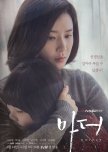
Being a single mother in South Korea can be quite hopeless, that´s where this story is coming from
Yes, you should watch it.As the title suggests, "Mother" deals with the archetypal theme of 'motherhood'. When is a mother a (good) mother? Once a mother = always a mother? Who can become a mother? Who has to be, no matter what? ... So far "Mother" isn't necessarily specific to Korea in terms of its story. (Actually the original is Japanese). But "Mother" is also (and most importantly) about the stigma of single mothers - and for South Korea that is outstandingly detrimental. From this point of view, this KDrama becomes immediately socially critical: if the position of the single mother in South Korea weren't so hopeless, then the whole story wouldn't have developed the emotional drive that it has.
In this context, "Mother" also confronts the viewers with two other socially sensitive issues in their manifold entanglements: child abuse and vigilantism. It is a dramatic fact around the world on the subject of child abuse that dealing with domestic violence is legally difficult. If you go the official route, you can only intervene when it is already too late. In the case of "Mother", essentially almost all mothers featured are to some extend criminals before the law (of one kind or another).
The hearty fare in terms of its sensitive content is, however, in a digestible way illuminated with all the proven stylistic devices of KDrama. The subject is dark and exhausting, but there is still room for light, color, joy and heartwarming in the presentation. Despite all the traumatization, the abused child is primarily a ray of hope (isn´t poetic freedom just wonderful!). It's no surprise that up-and-coming actress Heo Yool was named "Best New Actress" at the 2018 BaekSang Arts Awards... Her play ist simply amazing! (And not just hers...)
"Mother" aired on South Korean television during weekdays at 9:30 p.m. Regarding the scenes about child abuse, the age rating here has been set at 16, as opposed to the more usual 13 years. The KDrama "Mother" was released in 2018. It may be simple coincidence or even correlation: the KDrama just happened to present a burning topic of society at the time: In 2019 there was a change in law, which means that at least abortion now is legally possible for all women in the first 14 weeks without punishment.
-------------------- Side note: --- Orphanage and Single Motherhood in South Korea ---
If you are unmarried and happen to get pregnant, in South Korea you will have a hard time, still today. Exclusion, hostility, mobbing, unemployment, pressure from all sides are not uncommon.
If you are the child of a single mother, trauma of some sort is almost certain - mobbing, devaluation, child abuse, orphanage and/or adoption, you name it.
Noticeably, the 'orphanage' often plays a role for one of the protagonists in KDrama. That's not because it's such a stirring story hook, but because it's a current influence in the lives of many children (and now adults) of South Korean descent. Since the 1950s, the number of officially and unofficially adopted South Korean children, mainly from abroad, is estimated at 150,000 to 200,000. Another global leading position for South Korea... At first there were many war-orphans among them, otherwise there were also children from poor families. But since the 1980s, the main causes have been that the mothers are single parents. Desperate women - for whatever reason single with a child - often have no choice (to give themselves and the child a promising chance in life) than to give the child away - thus giving them a new chance with the option of being adopted to a solid family sooner or later...
For the children in the orphanage, the parents are not necessarily dead. However, their mothers gave up their parenthood at the door for a good reason: because society with its traditional value system does not accept a concept beyond ´traditional´ family. Single parents are not welcome. However, since abortions were also undesirable - i.e. forbidden for ages, unmarried pregnant women always found themselves in great distress... It was only in 2019 that the ban on abortions - that had been in force up to that point - was declared unconstitutional, so that pregnant women are now at least up to the 14th week without specifying abortion without punishment, in the case of rape up to the 24th week.
--------------------
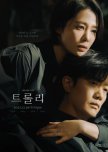
Its empathic. Powerful. Yet, beware: it is rather slow & actually not on the bright side of life
"Trolley" is a SBS production for South Korean TV first of all, even it is promptly running on Netflix, too. One could say that the KDrama is about a politician's wife, who is caught up in an emotionally draining past and overtaken by an extremely unpleasant present. One could say that it is about an ambitious politician with a promising career, who is in the middle of the national assembly election campaign and will give everything for it. One could say that it is about the classic moral trolley dilemma, which is running through the story like a key note – should one intervene in the unstoppable, catastrophic events and sacrifice one human life in the process, or let things take their course, the but then (in the case of the trolley dilemma) will claim several victims? With respect to each of these varying aspects, the story delivers suspense, depth and emotional intensity, enriched with complex details until the end.
"Trolley" is like a large patchwork quilt made up of many colorful, isolated, fateful pieces of the jigsaw puzzle that becomes a whole while increasing in suspense episode by episode. And this spectacular whole is what I particularly appreciate about this KDrama. Because the production is dedicated to a sensitive issue in South Korea society: the devaluation, harassment, oppression, contempt, discrediting, defamation, exploitation, sexualization of women and widespread physical violence against them.
The KDrama articulates a quiet howl calling for change. This howl, which has been rather mute for the longest time, wants a voice. This howl of pain wants to be heard. One voice should become many. Laws protecting women (and victims of abuse in general) would be all well and good. But even more so (and above all) there is a need for courageous role-models of women (and men) who lead the way. (Or for a start: KDramas and their e.g. female protagonists...) Role models are needed, who stand up for themselves, for their lives, for what happened to them, and for their rights as human beings. Tangible role models are needed embodying what lies at the heart of (these much-needed) laws: the non-debatable dignity inherent in every human being, regardless of gender, creed, birth, or ability. Paragraphs alone are not enough. They must be filled with life. With people who dare to actually venture out of the familiar swamp with their heads held high. And that's (for women) still easier said than done in South Korea 2023. "Trolley" embodies these circumstances in an impressive way. In fact, this is more than overdue. This TV production also places this message with some force and spreads it worldwide, too, so it cannot be overheard. Can it? May the message get through and encourage … women, young people, … and men too.
However, the spotlight is not directed at one or 'the' man as such, but at society as a whole, in which women structurally function (or supposed to function) well; in which they themselves participate in the premises - as mothers, as classmates, as part of a bullying, via public and Social media easy to manipulate crowd. The poisonous social thorn is so deeply rooted within women themselves: a systematically and consistently cultivated, inferior attitude towards their life. The the circumstances usually aren´t even seriously questioned because: that's the way it is… has been… (will be?)
Practically all of the women in this KDrama represent a self-esteem that has been deeply hurt and thus weakened as a result of private and public devaluation or even physical violence. They all somehow learned to live with it. They are battered, wounded and scarred, and they suffer from their feeling of inferiority that weakens them into old age. The worst thing about it: that they are still standing there alone, because nobody really can/wants to acknowledge their suffering and justified anger. Women have had to learn to live with the fact that there are no witnesses, no advocate, no encouragement, no attention, no consolation for them and their traumatic experience of harassment. No one is standing in their corner. The social message: You didn't deserve anything else. You´re to blame. 'Submissive, quiet, tame and silenced, everyone can do whatever they want.' Such is fate as a daughter. As an unwanted daughter. As the first daughter. As a daughter-in-law. As a wife. As a divorced woman. As an illegitimate mother. That something, which has remained deeply in these women, now shows impact, too: so that they either secretly and quietly devalue and question themselves, alternatively devalue others on their behalf, or let others devalue them on principle. This painful experience has not been redeemed to this day and should not be redeemed (from the social point of view of some). It is the ingrained yet invisible mark that South Korean society brands its women with. With "Trolley" it is out in the open. In multiple ways. Options for change are discussed, and the difficulties involved are also explored.
A strong portrait of society, cleverly prepared and seriously presented, yet in an entertaining manner. The KDrama meets a red-hot zeitgeist that calls for winds of change. The story courageously challenges the conservative, patriarchal attitude, which by nature denies women the right to be fully acknowledged human beings with the same rights. In the course of the last year, blood boiled high in South Korea after President Yoon declared 'structural sexism' being no longer existent in the Republic and wanted to abolish the Ministry for Equality and Family (or move it to other departments). In these times (see also the side note below), "Trolley" is a courageous and important production, because it tells a different story - that of devalued, sexualized, abused women in a self-satisfied man's world. Respect!
Its empathic. Powerful. Yet, beware: it is rather slow and actually not on the bright side of life.
---------------------------------------------------------------
SIDE NOTE: --- Always burning topical: violence against women in South Korea ---
If you compare the crime statistics in (i.e.) Germany and South Korea, South Korea is clearly the safer country. Seoul is arguably one of the safest cities in the world. But not for women...
Overall, violence in South Korea may be limited. But against women it is alarmingly widespread. Of the violent crimes recorded in South Korea, about 80 percent of the victims are women. In 2020, more than 58 incidents of sexual violence, including rape, were recorded among 100,000 residents in South Korea. (There were 12 in Germany for comparison). There have been newspaper reports of brutal femicides almost weekly in recent years. In a national survey conducted by the Ministry for Gender Equality and Family in the summer of 2021 (the ministry still existed then), 57.8 percent (!) of women stated that they felt threatened by misogynistic violence.
But the current political line is different. President Yoon stands for the values of the so-called "New Men's Solidarity". Behind this is a deeply patriarchal, conservative thinking that denies women to be full human beings with the same rights. Accordingly, the official line tends to go backwards: the penalties for false allegations of sexual assault are increased and the politicians rather argue with classic perpetrator-victim reversal: the women provoked the men by not doing what the men want them to do . Courts rarely judge in the interests of women. On the contrary. The outcome might be: victims of sexual violence are punished more severely than the perpetrators. Law against defamation of sex offenses is far stricter than that on sex offenses. It allows victims of sexual violence to be sentenced to up to 3 years in prison – even if it is proven that their publicly disclosed allegations are true. In the actual cases of sexual offenses, the verdicts against the perpetrators, however, are mostly merciful, with a mild sentence for crimes against women, as soon as there is one or the other weakening reason or an impeccable good reputation. Lax investigations and re-traumatizing behavior towards female victims in police and judicial authorities make matters worse.
All in all, it is very difficult for women to effectively defend themselves against the violence they might have experienced. Headwind blows from almost everywhere. Here we are again with the deeply patriarchal, conservative basic attitude of a society that denies women as a matter of course that they are full human beings with the same rights. This 'self-evidence' needs to be questioned and confronted. Resistance works best when women unite and at least start to stop this structural mutual devaluation among themselves. Speak, talk, share, cry, console... You don't need laws for that. Supporting one another, acknowledging injustice as such, comfort and compassion would be soothing ointments on the wounds of countless women that could heal a little bit better that way.
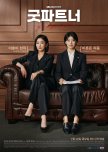
About "good" partners in various senses. A pleasantly vivid and complex, well-rounded story.
“Good Partner” is about lawyer and divorce cases, while radiating quite some ´work life in Seoul´ feeling. The main focus obviously is on divorce and everything that comes with it. In South Korea so far, divorce has been an issue ´non grata´ sort of. But it has become quite hot recently. Being able to deliberately elaborating this topic in a KDrama is due to exploding divorce rates. Even the older generation is increasingly daring to take measures by leaving the unhappy marriage behind and finally daring to make a new start. Of course, separation is never easy and becomes even more complicated as children are involved. “Good Partner” tackles the hot topic fearlessly. Additionally, some still questionable legal issues surrounding divorce are mercilessly brought to light, as are the notorious cheaters and the tragic, far too frequent cases of misogynistic, domestic violence.“Good Partner” also deals with the rigid chains of command, often enough turning lawyers in large law firms into mere underlings. On the other hand, the KDrama also confronts the question of the right dose of sense of morality, distance or even abstinence one should/must/may/want to emotionally attach to the cases. Furthermore, "Good Partner" also confronts the closed-meshed career culture in everyday office life, where employees can quickly lose themselves while living up to expectations. Work-Life-Balance ist still a fairly new concept. And last but not least, a critical swipe at the unfairly privileged “elite” (= “we have special status and are allowed to do everything”) should not be missing, too.
Embedded in the office world of the two protagonists, quite a lot of contemporary burning issues that currently concern and shape the lives of many people i.e. in South Korea, especially in Seoul, are carefully considered and illuminated from different sides. In doing so, the KDrama is opening up new space for contemporary approaches towards dealing with well-known life issues. A pleasantly vivid and complex, well-rounded story.
“Good Partner” feels like it gets better with each episode. This is also due to the development of the protagonists as they sincerely face their personal concepts and convictions again and again in the context of their cases (not least thanks to Han Yu Ri's untiring sense of morality)... Thus, in the long run, the KDrama is about "good" partners in various senses, not only when it comes to the female leads. However, together those two are creating a pleasant breeze of sisterhood, one that feels particularly good in the midst of a predominantly patriarchal world.
All of this makes “Good Partner” a deserved success. TV audience in the country more than doubled over the course of the 16 episodes. Understandably so. I can definitely recommend this series.
PS:
PLEASE do yourself a favor and give episode “0” a wide berth!!
It's a complete aberration and has nothing to do with the actual KDrama, except that someone apparently got bored during the temporary broadcast break during the 2024 Summer Olympics... You can definitely ignore that one, believe me.

You can look forward to a spicy mixture of fun and seriousness
For all the law-and-order series that the KDrama Orbit has so far produced in 2022, Law Café romps on the more witty, hilarious rom+com side. A web comic served as a template.Nonetheless. For all its playful wit, it is also a production that has its serious moments as well. In the background wafts an ugly (as usual) Jaebeol mess at the expense of the honest simple people. In the foreground, the protagonist fights for the rights of ordinary people with a lot of passion, intelligence, courage and the active support of old and new friends as well as her (after all) love interest. The legal cases dealt with are close to everyday sorts of topics and provide an up-to-date overview of perennial issues such as bullying, child abuse, sloppiness in construction, etc.
The idea of setting up a Law Cafe away from the usual law firm business is unique. There visitors can get professional legal advice in addition to barista coffee in a comfy atmosphere. All of the characters are originals, and their quirks and idiosyncrasies are cheerfully staged here and there. You can literally feel the underlying comic.
The focus is on the 'four-dimensional' personality of Kim Yu-ri. (4D in Korean standards means a particularly eccentric, freaky, quite special character. 4D is generally considered a compliment, especially in the teen and KPop milieu.) She meets the ingenious, former public prosecutor Kim Jeong-ho, her school friend from back then and also son of a rich family. He lately indulges in idleness, enjoys his life in tracksuits - as a writer and real estate owner. There's some harmlessly sweet, romantic flirtation of the Korean decent kind, but also concentrated intelligence and creativity in solving some intricate cases. The evil, powerful business bosses and their crazy doings find an appropriate expression in the phrenetically perfidious, exalted, almost insane boss of the Dohan construction company.
Bottom line: You can look forward to a spicy mixture of fun and seriousness. To a love story. To a cast in good mood. To lively entertainment. However, I have to admit that 2 (sometimes 4) episodes a week was quite enough for me. I could easily wait for the new episodes. Thus, I wouldn't call the KDrama gripping. It is rather shrewed and witty in places. Rather harmless. However, it is not completely banal.
Overall, special care was taken to ensure that everyone in the audience understood the seriousness of the legal cases being dealt with. The deliberately sincere, almost missionary approach to e. g. the topic of sexism and "Yes means Yes" is remarkable. The KDrama obviously wants to be more than just good entertainment. And I think that the production succeeds in this mission quite well: A rom+com K-Drama, derived from a comic, that gently but firmly grabs society by the collar, in a good mood and optimistically presenting creative ways, how despite all the existing corruption business surrounding the machinations of the powerful, justice could actually be possible. It wouldn't be due to the law, because that would at least actually be available...
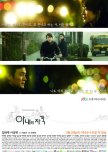
A career of the dismantling of a wife´s self-esteem and the almost impossible attempt of recapture
A highly valuable socio-critical study about being a wife, a mother, a granddaughter in South Korea today (actually 2012). The KDrama offers an in-depth (at times disturbing) insight into everyday Korean reality around the hierarchical concept of family and the upbringing of children. There is also a lot of local color about the simple everyday life of the lower and upper middle classes.The framework is provided by the madness about education, which in South Korea means that mothers in particular are under enormous pressure to perform (long before it really reaches the pupils themselves). The mothers are expected to support their child for the glory and honor of the family in such a way that it later has the best outlook on a professional career. Career in that sense is starting early...
"A Wife's Credentials" puts a critical magnifying glass on exactly this social dynamic. It also puts the magnifying glass on the disadvantage for women who give up (should give up!) their job with marriage/family life. Additionally, the KDrama also spotlights the issue of sexual assault in the workplace, the stigma of a single parent and finally social hierarchy.
It centers on So-rae, a once-creative young graphic designer and children's book illustrator who (one could say rather accidentally) stumbled into marriage and is now forced to prove herself as a housewife and mother in an ungrateful environment. A little bit of sunshine is provided by her son. However, in the end he too might be taken away from her. "A Wife´s Credentials" is basically illustrating the career of the dismantling of a wife´s self-esteem and the desperate, almost impossible attempt of recapture.
More than once you want to shake and shake even more not only So-rae but also many others. Yet, this is all due to family values and the social context in South Korea (...I wasn't aware of its extent the first time I saw the show). The tremendous injustice that So-rae is confronted with from several sides in addition to what she actually allows and gives in to, is rather disturbing and can eventually get on your nerves. For me as a woman, too, (yet being sozialized in Germany) it was sometimes extremely hard to bear.
This social study of a woman´s life (in South Korea) is painful to look at, yet told in a highly authentic manner. Thanks to veteran high-end actress Kim Hee-ae at its best, So-rae's emotional processes are brought to life even more authentically. With the example of her male protagonist facing the same subject - an unhappy marriage and a potential divorce - the dramatically differing social stand of men and women are presented rich in contrast!
The soundtrack stands in fresh contradiction to the sobering subject matter, which repeatedly embeds the events in a cheerful, confident atmosphere and encourages facing the challenges of life optimistically.
The various side plots profoundly round off the picture of contemporary society of that time. (Compared to more recent dramas, society´s expectations in that respect unfortunately doesn´t seem to have changed).
--------- SIDE NOTE --- Divorces ---
... in South Korea are still hardly socially accepted. At least ´adultery´, which was at the time of the KDrama still an illegal issue, that could be punished (in fact even with years in prison) is no criminal act anymore. However, a law is still in force, prohibiting adulterers in South Korea from starting divorce proceedings. Plus, in order for the divorce to be legal, both spouses must agree. And if so, at least significant monetary compensation must be expected. However, this obviously doesn´t help prevent adultery (especially among husbands) to happen. It´s rather a matter of hypocritical morals - a South Korean study in 2015 found that of surveyed men 50,8 percent cheated at least once. It is among men almost considered normal with no consequences for the valued concept ´family´. Whereas among women it was 9,3 percent - and there it seemingly happens more often at a point within the reationship, when the wife might also be prepared to end the ´failed family project´ - but cannot simply do so.
----------------------------------------------------------------------
At last, I deliberately want to mention the relationship between So-rae and Tae-oh, which is told in such a refreshing way that goes beyond the usual clichés. For once, no silly chastity. No romantic exaggeration. Real. Grounded. Not a hero, who would do everything unimaginable for his loved one so that the sun would rise in the west (...yeah, a little bit, though...) ... Instead, an appreciative, loving, grounded, not completely selfless, but patient partner at eye level and at your side, if woman needs him. Not Mr. Perfect, yet a man, who is prepared and willing to grow in relationship (even if it might be bothersome at times).
Finally, the coherently told story convinces with an ending that provides emancipated happiness - noiselessly, softly and with balanced steps.
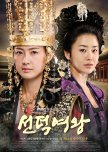
Brilliant. Timeless epic quality of emotionally processing the life of 2 historic heroines
This KDrama tells historical heroine stories for a change. (Yes: female AND plural.) On top of that, enriched along the way with some highly topical insights and a vivid examination of management systems - what does the common people need? How does it want or have to be lead? In this respect, the 2009 series has not lost any of its topicality. But above all, "Queen Seondeok" brings the viewers closer to the earlier (not so well represented in KDrama and KMovie) Korean history of the Three Kingdoms.Here, history is presented in 62 episodes in a moving manner and in dazzling characters, while offering valuable historical input. 62 episodes should not frighten you. This is perhaps more like 5 or 6 seasons western style. You don't have to go through all the episodes in one go, (but you can of course). To be honest, the number of episodes and the rather stiff-looking poster with a heavy crown kept me from watching the series for a long time. But that was a big mistake. This series is wonderful in view of the wealth of impressions, personal processes of the protagonists, and the profound examination of the attitude and philosophy of rulers. Also funny in places. In any case, an impressive piece of Korean history that is told in a round, rich and colorful way. The KDrama leaves nothing out when it comes to being human and being a hero - it presents all of this in various dramaturgical entanglements and depths, with twists & turns and deep feeling. (Swords, bows and battles are also included.)
This is about real historical personalities from Korean history, who made remarkable achievements in their time. First and foremost Queen Seondeok. She was the first Queen of Silla and the first of the few female heads of state in Korean history. If one considers her progressive achievements for her people, she must have been a charismatic personality in order to be able to place herself in the first, officially leading position in this feudal male world. Her life, but also that of other contemporary significant, history-shaping people in her environment are prepared dramaturgically lively and unforgettable. Admittedly enriched with a bit of poetic freedom in the service of a compelling and exciting story. However, in the historical drama orbit, it seems to me quite acceptable to bend the facts here and there in order to create a vivid impression of the character of the historical figures and their work instead. This is much more memorable (in passing) than exact chronologies. In addition, the actual valid sources that can be evaluated are limited. Even historiography has to do a bit of guessing every now and then to understand where, for example, a woman at that time got the vision, the strength and the courage to put men in the second row - and at the same time intelligent, visionary and with respect for the people, to rule in an almost idiosyncratic way.... In my opinion, the fictional plot does not damage the essential impression that one gets about life and challenges in the Silla Reich, about the charisma of the historical personality of Queen Seondeok and the historical figures around her plus her achievements for her people. The KDrama draws a memorable, unforgettable character portrait of the Silla Empire in the 7th century. In doing so, it brings the bones of the queen lying under one of the burial mounds in Gyeongju to life again.
Good to know: The Silla Empire was not yet under the influence of Confucianism, which clearly defines the man as the head of the family/tribe. Among the noble Silla families there were also those in which descent on the mother's side was decisive, or women were considered the heads of the family. At that time, matrilineal and patrilineal tribal structures still existed in parallel. Therefore, the respect for women and their functions in society was comparatively higher overall - but still not a matter of course.
For me, what is valuable about this story (and at the same time the timeless quality of the KDrama) lies in the juxtaposition of two very different, each impressive, intelligent female figures of their time: Princess Deokman (Queen Seondeok) and the noble concubine Misil, who hardly had an influential king or leader of the Hwarang left out during her time in order to directly influence political events. In fact, the two women did not live at the same time, but poetic freedom overrides this and juxtaposes the two as equal antagonists. (Extremely successful!)
The KDrama "Queen Seondeok" is characterized by a timeless epic quality in the emotional processing of the historical events. Brilliantly done in places, quite funny at times, with colorful vividness and everything that life usually entails: plenty of drama that stirs the spirits and also touches the heart. An exciting script (which in the second half has to work through a little more historical facts), and a colorful dance of highly inspired mimes, reviving those distant 50 years in the past 7th century. Not only the later queen and the concubine Misil get a memorable profile, also the men around Queen Seongeok - Bidam and Kim Yushin - are noticeably filled with life. Love story included - it's more of an encore than the main thing when it comes to the entire story, but it refreshes the second half as a balance to the historical ride through time.
By the way, the ratings literally went through the roof at 43.6 percent when the series was broadcast on television in 2009.
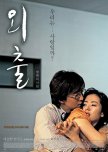
The main focus is not primarily on the action but the intervals. Intimate play. Highly committed.
The story is told quite sensitively, calmly, just a few dialogues. It is almost studio theatre that relies on the two main protagonists and thus on the haunting performance of Bae Yong-joon and Son Ye-jin.´He' is typical male, who feels like he owns the world - and now being confronted with his pride being hurt , whereas 'she' represents everything that makes a "good" wife: devoted, caring and - in case of doubt - convinced that she herself is to blame. However, for both of them as their former worlds fall apart their encounter sets processes in motion. They start questioning their lives. Quietly the chance for new orientation, for a new self-image and changed standards when it comes to relationships open up.
The title "April Snow" refers to the fact that the two protagonists love different seasons: he loves winter and she loves spring. Snow in April thus symbolizes a bridge that leads the two together. In the original, however, the title reads something like "Excursion" and refers to 'his' wife and 'her' husband who, as part of their affair, go on a secret trip on which their serious car accident brings everything to light...
(At first the story somehow reminded me a bit of the US movie "Random Hearts" from 1999. The KMovie "April Snow" from 2005, however, is not a remake, just a similar story.)
Yes, it is not a funny movie. Yes, it is intimate play on high studio theatre level. No effects. Just intense play. The main focus is not primarily on the action but the intervals in between. It´s different. Highly committed. Intense.
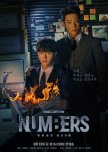
Don't be deterred by a supposedly dry accountants´ world. It´s feisty. Suspenseful. Emotional, too
"Numbers" is about auditors, balance sheets and accountants. It's obviously all about numbers. That may put some people off. It's also about what lies behind those numbers, and that may at times seem even more complicated to the uninitiated. However, deliberately illustrative examples are repeatedly interspersed. And it is even more gratifying that it is not necessary to understand all this in every detail in order to enjoy the series. “Numbers” is about a rational and clever mastermind. Yet it is also about having the heart at the right spot. It´s feisty. It´s also emotional. It stands up and means it. Great!"Numbers" is definitely worth it getting involved in the abstract world of accounting specialists. Especially since their decisions, in turn, have consequences for a world that juggles numbers even more aloof - Investment Fonds... While the auditors keep an eye on the current state of the balance sheet and put its potential through its paces, investors only care about future returns and often want the maximum profit regardless of the losses - which others have to bear for it.
Numbers are numbers. But the decisive factor is who has the sovereignty of interpretation. Numbers sound clean and objective, apparently. Yet, they stand for people, their visions and their decisions. Hidden underneath are solutions, too. As always, the question you´re asking, will make the difference – leading the way for your attention and focus. And as always, different possible perspectives exist. Also in the world of numbers.
"Numbers" is about a revenge campaign – again. There are actually several. It is about those who, with good reason, do not want to be intimidated by the power of the powerful – again. They have nothing (more) to lose. The bad guys are really bad. They have long lost their heart or never had one to begin with. This makes for plenty of interesting relationship dynamics.
"Numbers" also offers an interesting variety of intelligence and competence. Bottom line for revenge candidates – again: just on your own it is almost impossible to make a difference. However, someone courageously has to make a first clever and striking move ahead. With heart and soul. Then maybe others will remember that their heart was once in their right place, too. (In a rational, hierarchical world that takes for granted that there is no room for irrational emotions or personal interests, it's easy to forget just that.)
"Numbers" is a bold story about rather impure moves in the world of accounting and investment. A complex story. At the same time, an exciting, thrilling story that is fun, too. No matter how remote this world of dizzyingly high numbers may be for most of the audience, watching the story feels good overall. You get a high-flying, intelligent mixture. The actors show a strong presence in their roles and thus contribute a lot. The pace is right. OST fits fine.
My suggestion: don't be put off by suits, ties and a supposedly dry, conservative, number-dominated accountant business world. Sure enough, "Numbers" has it all!
------------------------------------------------------------------------
Side Note:
Banks in South Korea have been taboo for investors since the Asian crisis. For the bank sector, on the other hand, financial investment transactions are not permitted. Just now, in 2023, fundamental reforms were launched - some are even talking about a revolution. The banking sector is just now being opened up to new players in order to stimulate competition.


 9
9 41
41 15
15

















